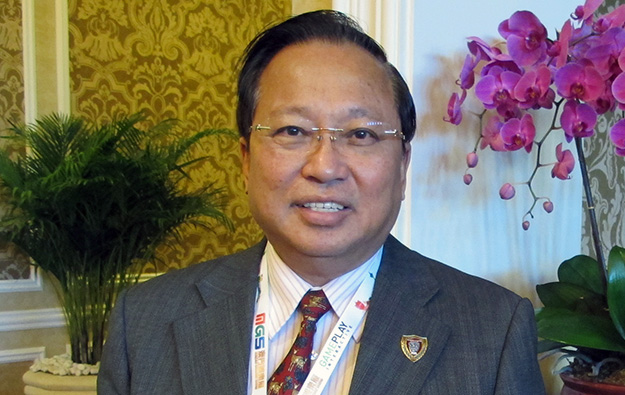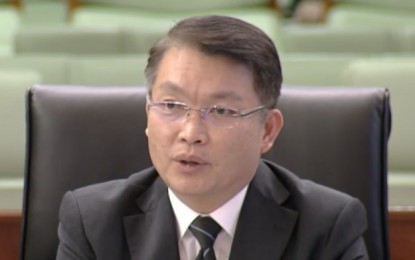Vietnam’s new casino decree likely in 1H2016: scholar
Nov 20, 2015 Newsdesk Latest News, Rest of Asia, Top of the deck

The Vietnamese government should release in the first half of next year a new set of rules to promote the development of the country’s gaming industry, Augustine Ha Ton Vinh (pictured), an academic who says he is advising the government on liberalising Vietnam’s gaming industry, stated on Thursday.
The new rules – in the form of a decree – would very likely allow Vietnamese nationals to gamble at home, he said. In addition, the new rules would halve the minimum capital investment required to access one of four licences still available for development of large scale casino resorts.
“A draft decree has been submitted to political decision-makers, but because of the political process, you would guess [publication would only occur] by probably March,” Mr Vinh told GGRAsia on the sidelines of the conference segment of the Macao Gaming Show 2015, ended on Thursday.
The draft decree was reportedly completed in August.
Vietnam’s ruling Communist Party is poised to select a new general-secretary in its 12th national congress. Such a decision is slated for early 2016.
Mr Vinh said that under the new decree it is very likely that Vietnam nationals would be allowed to gamble domestically, but not everyone. The gaming decree should define some eligibility criteria – including a minimum gambling age of 21 years and a minimum monthly income threshold. The latter would possibly be set at US$700, Mr Vinh suggested.
In the Philippines, casino legislation states that residents must have a gross income for the previous year of at least PHP50,000 (US$1,063) to be allowed to play in a casino. But some lawmakers there have argued the requirement is neither observed nor imposed.
Mr Vinh also said it was foreseeable that Vietnam would adopt a Singapore-style entry levy for casinos. Singapore imposes on its citizens and permanent residents a statutory entry fee of either SGD100 (US$71) for 24-hour access, or SGD2,000 for a year’s entry, but the city-state is content to give foreigners free access.
According to some media reports, the new rules for Vietnam might state that Vietnamese citizens would only be allowed to gamble in selected casinos. That would be a solution similar to what happens in South Korea, where only one of the country’s 17 casinos is authorised to accept bets from South Korean nationals.
Vietnam has a population of around 92.5 million. The country has several casinos, but authorities prohibit Vietnamese punters from gambling at home, unless they hold a foreign passport. Allowing locals to play – even under restricted conditions – is likely to boost the interest of foreign investors in the country’s casino market, according to several analysts.
Lower investment requirements
To attract further foreign investment into the country’s casino industry, the Vietnamese government is also looking at halving the minimum required capital investment for each of the country’s integrated resort licences. Currently the figure is set at US$4 billion.
Vietnam has so far issued only one of five expected licences for large-scale casino resorts. That was for the Ho Tram Strip project. Prior to the first phase opening of the Ho Tram Strip in July 2013 – with 541 five-star rooms and permission for up to 90 tables – the Vietnamese casino market consisted of small- and medium-sized properties mostly in the north and close to the land border with mainland China. The government has reportedly suspended its previous policy of issuing new licences for smaller scale casino resorts.
The Ho Tram Strip is a beachside resort 120 kilometres (75 miles) southeast of Ho Chi Minh City, the country’s main southern city formerly known as Saigon. “The total investment in Ho Tram Strip is now approaching nearly US$1 billion of the US$4.2 billion planned for the 2.2-kilometre beachfront development,” Asian Coast Development (Canada) Ltd, the company owning the Ho Tram Strip, said in a press release earlier this month.
“The government knows that it cannot, at this point, solicit any US$4-billion-dollar project,” Mr Vinh commented.
Macau – but also other gaming jurisdictions in Asia – is hurting from the ongoing anti-corruption drive in mainland China, a slowdown in the Chinese economy and increased scrutiny of the junket system by Beijing, investment analysts have said. Chinese high rollers are an important source of revenue for several casinos in the Asian region, not just for Macau casinos.
With the new legislation in place, Mr Vinh says it will be easier to attract foreign investment to Vietnam’s casino sector.
“There are both local and international investors that are in the process of looking at sites and discussing with the [regional] governments,” he said.
Mr Vinh added: “The government is very interested in international operators, because Vietnamese don’t have the expertise. Vietnamese can co-invest; can come in with the [other] resources.”
The scholar forecast that “Vietnam could become a market worth US$3 billion to US$6 billion a year” in gross gaming revenue following the opening of all tabled casino resorts and with locals allowed to gamble domestically. Vietnam’s casinos posted aggregate revenue of VND1.4 trillion (US$62.3 million) in 2014, according to a report by the country’s Institute for Regional Sustainable Development, said local media.
A number of international gaming operators has shown interest in running a casino planned for the second phase of Vietnam’s Laguna Lăng Cô beach resort, Andrew Klebanow of Global Market Advisors LLC, a firm advising on the procurement process, told GGRAsia last month.
Sheldon Adelson, the chairman of Las Vegas Sands Corp – a casino firm with operations in the United States, Macau and Singapore – has confirmed in interviews making several trips to Vietnam to scout for resort building opportunities. Such trips have not so far led to further steps, due to the local gambling restrictions. U.S.-based gaming operator MGM Resorts International, with a subsidiary in Macau, was originally involved in the Ho Tram venture on a branding and management basis, but pulled out prior to the opening.
Chow Tai Fook Enterprises Ltd, a privately held conglomerate controlled by the family of Hong Kong businessman Cheng Yu Tung, earlier this year did become involved in a casino resort project in Vietnam’s Quang Nam Province. Mr Cheng is a long-standing business partner of Stanley Ho Hung Sun, a founder of Macau casino investor SJM Holdings Ltd.
Related articles
-
 Vietnam locals-play pilot confirmed to...
Vietnam locals-play pilot confirmed to...Nov 06, 2024
-
 Casino op Donaco fiscal year 1Q EBITDA...
Casino op Donaco fiscal year 1Q EBITDA...Oct 25, 2024
More news
-
 Macau to get 36mln visitors in 2025:...
Macau to get 36mln visitors in 2025:...Nov 21, 2024
-
 EBITDA a focus in Macau market share...
EBITDA a focus in Macau market share...Nov 21, 2024
Latest News
Nov 21, 2024
Macau’s 2025 visitor tally could reach 36 million, or a circa 9-percent gain on this year’s projected 33 million. So said Lei Wai Nong (pictured in a file photo), the city’s Secretary for...Sign up to our FREE Newsletter
 (Click here for more)
(Click here for more)
Pick of the Day
”[Baccarat side bets in Macau] are becoming more popular amongst players, based on what we observed when we conducted our [monthly premium mass] table surveys”
George Choi and Timothy Chau
Analysts at Citigroup
Most Popular
 Gaming technology firm IGT reports hacking incident November 21, 2024
Gaming technology firm IGT reports hacking incident November 21, 2024  US$30bln 2025 GGR target achievable for Macau: CE November 19, 2024
US$30bln 2025 GGR target achievable for Macau: CE November 19, 2024  Marina Bay Sands projects 40pct EBITDA leap post extension November 20, 2024
Marina Bay Sands projects 40pct EBITDA leap post extension November 20, 2024  Macau big-event outdoor venue gets trial run Dec 28: CE November 20, 2024
Macau big-event outdoor venue gets trial run Dec 28: CE November 20, 2024  Future of gaming is the online format: Pagcor chairman November 20, 2024
Future of gaming is the online format: Pagcor chairman November 20, 2024









